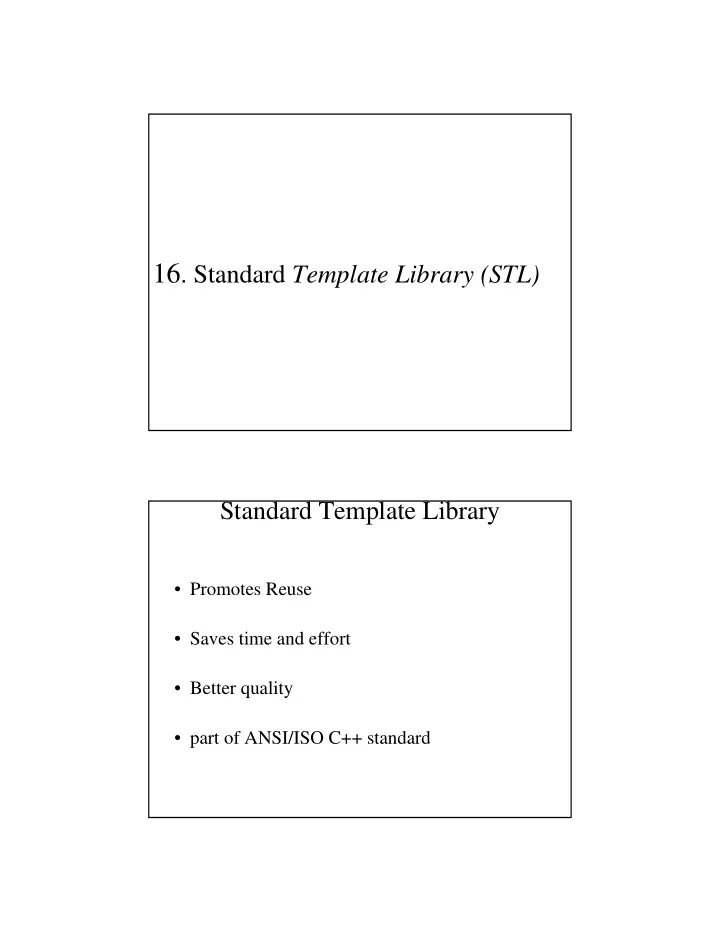

16 . Standard Template Library (STL) Standard Template Library • Promotes Reuse • Saves time and effort • Better quality • part of ANSI/ISO C++ standard
STL headers • Defined in std namespace • Headers are of form <headername> without the .h • Containers: – <vector>, <list>, <deque>, <queue>, <stack>, <map> (also multimap), <set> (also multiset), <bitset> • Iterators: – <iterator> • Algorithms: – <algorithm> • Strings: – <string> STL Containers • Sequence Containers – vector insert/delete at back, access any elem – deque insert/delete front/back, access any elem • Double ended queue ( deck ) – list doubly linked list, insert/delete any where • Associative Containers – set lookup, no duplicates – multiset lookup, duplicates OK – map one-to-one mapping, no duplicates, key-based lookup – multimap one-to-many, duplicates OK, key-based lookup • Container Adapters – stack Last-in-first-out – queue First-in-first-out – priority_queue highest priority element is first out
Container Types • First-class Containers: – Sequence containers and Associative containers • Near Containers (Almost containers) – arrays, string, bitset, valarray Which one to choose? • Standard Containers are interchangeable • Each container is efficient for a certain usage – Key based look up: map – List operations: list – Add/remove elements at end: deque, stack, queue – Most common usage: vector
Common Operations and Members • Common Member Types – value_type, allocator_type, size_type, difference_type, iterator, const_iterator, reverse_iterator, const_reverse_iterator, reference, const_reference, [ for associative only: key_type, mapped_type, key_compare] • Common Operations – Iterators • begin(), end(), rbegin(), rend() – Elements access • front(), back(), [not for list: [] (unchecked subscripting), at()] – Stack and Queue operations • push_back(), pop_back(), [list and deque only: push_front(), pop_front()] – List Operations • insert(), erase(), clear() Containers and Efficiency [] List Ops Front Ops Back Ops Iterator Type vector O(1) O(n)+ O(1)+ Random list O(1) O(1) O(1) Bidirectional Sequence deque O(1) O(n) O(1) O(1) Random stack O(n) O(1) queue O(n) O(1) O(1) Adaptor priority_queue O(log n) O(log n) map O(log n) O(log n)+ Bidirectional multimap O(log n)+ Bidirectional Associative set O(log n) O(log n)+ Bidirectional multiset O(log n)+ Bidirectional string O(1) O(n)+ O(n)+ O(1)+ Random array O(1) Random Near valarray O(1) Random bitset O(1) "+: May incurr extra cost occasionally" Source: C++ Programming Language, 3rd. Ed., Bjarne Stroupstrup.
Iterators • Iterators used to point to an element of a container • Container’s – begin() returns an iterator pointing to the first element – end() returns an iterator pointing to the end (next to last) • Use instance of iterator to point to element you want to modify • Use instance of const_iterator to point to element you do not want to modify • *iter refers to the pointed element • ++iter advances the iterator to point to the next element Category of Iterators and Operations ++itr ++itr input output itr++ itr++ *itr (rvalue) *itr (lvalue) itr1 = itr2 itr1 == itr2 forward itr1 != itr2 --itr bidirectional itr-- itr += i itr -= i random access itr [i] itr1 <= itr2 not all operations listed itr1 >= itr2
Iterators Aid Generic Programming Iterators decouple Algorithms from Containers Algorithm Iterator Container Algorithms in STL • Algorithms are used to manipulate containers • Loosely coupled to the containers • Works on Iterators returned by Containers • Returns Iterator to element/result • Examples: sort, search, delete, find, insert, etc.
STL Algorithms • Mutating-sequence algorithms: – copy, copy_backward, fill, fill_n, generate, generate_n, iter_swap, partition, random_shuffle, remove, remove_copy, remove_copy_if, remove_if, replace, replace_copy, replace_copy_if, replace_if, reverse, reverse_copy, rotate, rotate_copy, stable_partition, swap, swap_ranges, transform, unique, unique_copy • Non-mutating-sequence algorithms: – adjacent_find, count, count_if, equal, find, for_each, mismatch, search, search_n • Numerical algorithms – accumulate, inner_product, partial_sum, adjacent_difference Lab Work: Details provided on-line.
Recommend
More recommend